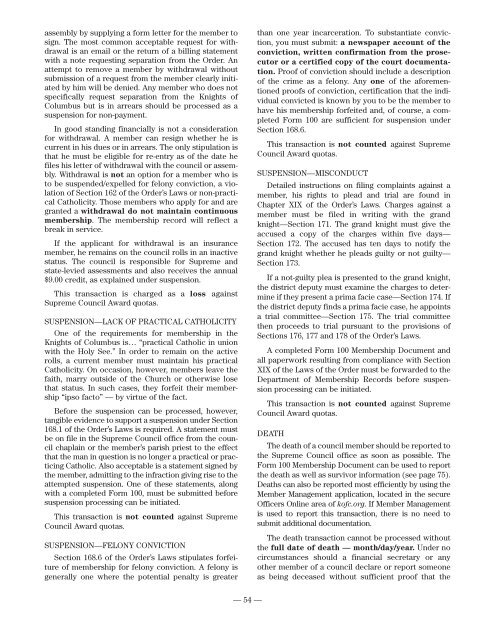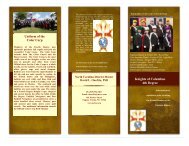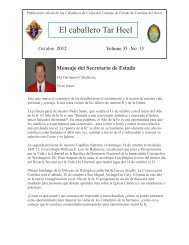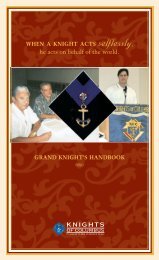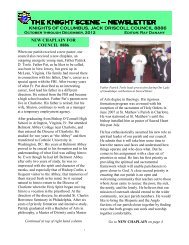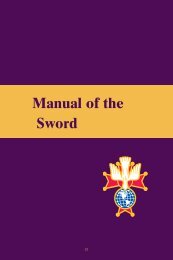Financial Secretary Handbook - Knights of Columbus, Supreme ...
Financial Secretary Handbook - Knights of Columbus, Supreme ...
Financial Secretary Handbook - Knights of Columbus, Supreme ...
Create successful ePaper yourself
Turn your PDF publications into a flip-book with our unique Google optimized e-Paper software.
assembly by supplying a form letter for the member to<br />
sign. The most common acceptable request for withdrawal<br />
is an email or the return <strong>of</strong> a billing statement<br />
with a note requesting separation from the Order. An<br />
attempt to remove a member by withdrawal without<br />
submission <strong>of</strong> a request from the member clearly initiated<br />
by him will be denied. Any member who does not<br />
specifically request separation from the <strong>Knights</strong> <strong>of</strong><br />
<strong>Columbus</strong> but is in arrears should be processed as a<br />
suspension for non-payment.<br />
In good standing financially is not a consideration<br />
for withdrawal. A member can resign whether he is<br />
current in his dues or in arrears. The only stipulation is<br />
that he must be eligible for re-entry as <strong>of</strong> the date he<br />
files his letter <strong>of</strong> withdrawal with the council or assembly.<br />
Withdrawal is not an option for a member who is<br />
to be suspended/expelled for felony conviction, a violation<br />
<strong>of</strong> Section 162 <strong>of</strong> the Order’s Laws or non-practical<br />
Catholicity. Those members who apply for and are<br />
granted a withdrawal do not maintain continuous<br />
membership. The membership record will reflect a<br />
break in service.<br />
If the applicant for withdrawal is an insurance<br />
member, he remains on the council rolls in an inactive<br />
status. The council is responsible for <strong>Supreme</strong> and<br />
state-levied assessments and also receives the annual<br />
$9.00 credit, as explained under suspension.<br />
This transaction is charged as a loss against<br />
<strong>Supreme</strong> Council Award quotas.<br />
SUSPENSION—LACK OF PRACTICAL CATHOLICITY<br />
One <strong>of</strong> the requirements for membership in the<br />
<strong>Knights</strong> <strong>of</strong> <strong>Columbus</strong> is… “practical Catholic in union<br />
with the Holy See.” In order to remain on the active<br />
rolls, a current member must maintain his practical<br />
Catholicity. On occasion, however, members leave the<br />
faith, marry outside <strong>of</strong> the Church or otherwise lose<br />
that status. In such cases, they forfeit their membership<br />
“ipso facto” — by virtue <strong>of</strong> the fact.<br />
Before the suspension can be processed, however,<br />
tangible evidence to support a suspension under Section<br />
168.1 <strong>of</strong> the Order’s Laws is required. A statement must<br />
be on file in the <strong>Supreme</strong> Council <strong>of</strong>fice from the council<br />
chaplain or the member’s parish priest to the effect<br />
that the man in question is no longer a practical or practicing<br />
Catholic. Also acceptable is a statement signed by<br />
the member, admitting to the infraction giving rise to the<br />
attempted suspension. One <strong>of</strong> these statements, along<br />
with a completed Form 100, must be submitted before<br />
suspension processing can be initiated.<br />
This transaction is not counted against <strong>Supreme</strong><br />
Council Award quotas.<br />
SUSPENSION—FELONY CONVICTION<br />
Section 168.6 <strong>of</strong> the Order’s Laws stipulates forfeiture<br />
<strong>of</strong> membership for felony conviction. A felony is<br />
generally one where the potential penalty is greater<br />
than one year incarceration. To substantiate conviction,<br />
you must submit: a newspaper account <strong>of</strong> the<br />
conviction, written confirmation from the prosecutor<br />
or a certi fied copy <strong>of</strong> the court documentation.<br />
Pro<strong>of</strong> <strong>of</strong> conviction should include a description<br />
<strong>of</strong> the crime as a felony. Any one <strong>of</strong> the aforementioned<br />
pro<strong>of</strong>s <strong>of</strong> conviction, certification that the individual<br />
con victed is known by you to be the member to<br />
have his membership forfeited and, <strong>of</strong> course, a completed<br />
Form 100 are sufficient for suspension under<br />
Section 168.6.<br />
This transaction is not counted against <strong>Supreme</strong><br />
Council Award quotas.<br />
SUSPENSION—MISCONDUCT<br />
Detailed instructions on filing complaints against a<br />
member, his rights to plead and trial are found in<br />
Chapter XIX <strong>of</strong> the Order’s Laws. Charges against a<br />
member must be filed in writing with the grand<br />
knight—Section 171. The grand knight must give the<br />
accused a copy <strong>of</strong> the charges within five days—<br />
Section 172. The accused has ten days to notify the<br />
grand knight whether he pleads guilty or not guilty—<br />
Section 173.<br />
If a not-guilty plea is presented to the grand knight,<br />
the district deputy must examine the charges to determine<br />
if they present a prima facie case—Section 174. If<br />
the district deputy finds a prima facie case, he appoints<br />
a trial committee—Section 175. The trial committee<br />
then proceeds to trial pursuant to the provisions <strong>of</strong><br />
Sections 176, 177 and 178 <strong>of</strong> the Order’s Laws.<br />
A completed Form 100 Membership Document and<br />
all paperwork resulting from compliance with Section<br />
XIX <strong>of</strong> the Laws <strong>of</strong> the Order must be forwarded to the<br />
Department <strong>of</strong> Membership Records before suspension<br />
processing can be initiated.<br />
This transaction is not counted against <strong>Supreme</strong><br />
Council Award quotas.<br />
DEATH<br />
The death <strong>of</strong> a council member should be reported to<br />
the <strong>Supreme</strong> Council <strong>of</strong>fice as soon as possible. The<br />
Form 100 Membership Document can be used to report<br />
the death as well as survivor information (see page 75).<br />
Deaths can also be reported most efficiently by using the<br />
Member Management application, located in the secure<br />
Officers Online area <strong>of</strong> k<strong>of</strong>c.org. If Member Management<br />
is used to report this transaction, there is no need to<br />
submit additional documentation.<br />
The death transaction cannot be processed without<br />
the full date <strong>of</strong> death — month/day/year. Under no<br />
circumstances should a financial secretary or any<br />
other member <strong>of</strong> a council declare or report someone<br />
as being deceased without sufficient pro<strong>of</strong> that the<br />
— 54 —


